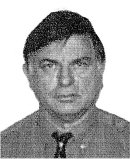|
Plenary
Lecture
Genetic Search Algorithms to Fuzzy Multiobjective Games:
a Mathematica Implementation

Professor Andre A. Keller
Universite de Lille 1 Sciences et Technologies
Cite Scientifique 59655 Villeneuve d'Ascq Cedex FRANCE
E-mail:
andre.keller@univ-lille.fr
Abstract: Genetic
stochastic search algorithms (GAs)
have soon demonstrated their
helpful contribution in finding
solutions to the complex real-life
optimization problems. In 2005,
Mastorakis' method successfully
combines the GAs with the Nelder-Mead
(NM) simplex optimization
technique: the GAs are used first
to reach the neighborhood of some
global extremum, and the NM
algorithm then finds it exactly.
Playing games with genetic
algorithms has been already
proposed: it is a means of seeking
better strategies in playing
repeated games. These algorithms
have been applied extensively for
solving Nash equilibria of fuzzy
bimatrix games with single
objective. The experience shows
the ability of the GAs to find
solutions to equivalent quadratic
programming problems without an
exhaustive search. In 2002, Chen
extends the applications to
multiple objective programming
problems, without weighting the
desired objectives contrary to the
Nishizaki-Sakawa models. This
lecture is an attempt to consider
the complexity of the real
situations, when the decision
makers are facing to multiple
simultaneous objectives in a fuzzy
environment. The software
MATHEMATICA 7.0.1 is used to
implement these techniques in a
high-performance computing
environment.
Brief Biography of the Speaker:
Professor Andre A. Keller is an
associate researcher in
mathematical economics at CLERSE -
Centre Lillois d'Etudes et de
Recherches Sociologiques et
Economiques - a research unit UMR/CNRS
8019 of the French 'Centre
National de la Recherche
Scientifique (CNRS)' from the
University Lille 1, Sciences et
Technologies. Prof. Keller is
graduated in econometrics and
operations research, and received
his PhD in Economics in 1977 from
the Universite de Paris I. Prof.
Keller taught applied mathematics
(optimization techniques),
econometrics, microeconomics,
theory of games and macrodynamics.
His experience centers are on
discrete mathematics (graph theory),
building and simulating large
scale macro-econometric models.
Since 1985, his research interest
has concentrated on modeling high
frequency time-series: spectral
properties of usual filters,
automatic selection of ARIMA
models, efficiency tests. Since
1990, Prof. Keller's research is
centered on discrete mathematics (graph
theory), stochastic differential
games and tournaments, circuit
theory of environmental systems,
dynamics and optimal control under
uncertainties, as in a fuzzy
environment. Prof. Keller's
publications in journals and
proceedings are on model building
and game theory, with application
to macroeconomics and
international finance. Books
chapters are on semi-reduced forms
of econometric models (Martinus
Nijhoff, 1984), econometrics of
technical change (Springer and
IIASA, 1989), advanced time-series
analysis (Woodhead-Faulkner),
circuits enumeration in digraphs (Springer,
2008), stochastic differential
games (Nova Science, 2009),
optimal fuzzy control (InTech,
2009), circuit analysis (Nova
Science, forthcoming 2010).
|
